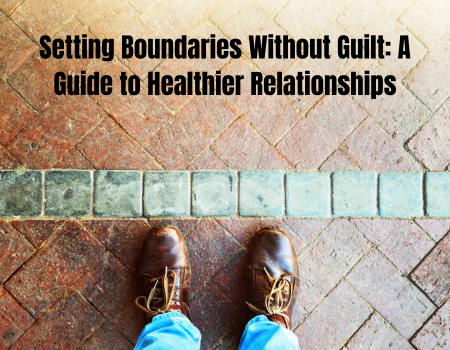Setting boundaries is one of the most powerful forms of self-respect—but for many people, it comes with a heavy side of guilt. The thought of saying “no,” asking for space, or communicating personal limits often brings fear of disappointing others or being labeled selfish. However, boundaries are not walls to shut people out—they are bridges to healthier relationships.
Here’s how setting boundaries without guilt can help and why doing so is essential for your well-being and the strength of your relationships.
 Understand What Boundaries Really Are
Understand What Boundaries Really Are
Boundaries are personal limits that protect your mental, emotional, and physical space. They’re not punishments or ultimatums. Instead, they are expressions of what you need to feel safe, respected, and valued in your interactions. Boundaries help define where you end and others begin, which is key to maintaining a sense of identity and inner peace.
Without boundaries, relationships can become draining or dysfunctional. Setting boundaries is not about control; it’s about clarity.
Recognize That Guilt Is a Habit, Not a Signal
Guilt often stems from the belief that we’re responsible for other people’s feelings or that saying “no” makes us bad or unkind. But guilt in the context of healthy boundary-setting is usually misplaced. It’s a learned emotional response, not a reliable indicator that you’re doing something wrong.
To overcome guilt, ask yourself: “Am I truly harming this person, or am I simply prioritizing my well-being?” If the answer is the latter, then that guilt is a sign you’re growing, not doing something wrong.
Start Small and Be Clear
You don’t have to overhaul your life overnight. Start with small, manageable boundaries—like turning off your phone after 9 PM, saying no to one extra task at work, or declining a social event that drains you.
For example:
Instead of saying, “Instead of saying, “I can’t help you,” try, “I really want to support you, but I’m currently at my limit and can’t give it the attention it deserves. Let’s find another way.”
This approach is honest, respectful, and affirms your limits without unnecessary conflict.
Communicate With Confidence, Not Apology
One reason people feel guilty setting boundaries is they feel the need to over-explain or apologize. But boundaries are not offenses—they’re personal truths.
You don’t need to justify your limits with long stories. A simple, confident “I’m not available at that time” is enough. Avoid over-apologizing. You’re not doing something wrong—you’re doing something necessary.
Expect Discomfort—but Don’t Back Down
People who are used to you being constantly available might initially resist your boundaries. That’s okay. Discomfort doesn’t mean your boundary is wrong—it often means it’s been needed for a while.
Stand your ground with grace. Over time, people who respect you will adjust. Those who don’t may fall away—and that’s a form of natural alignment, not loss.
Remember: Setting Boundaries Strengthen Relationships
Despite the common myth that boundaries create distance, healthy boundaries actually foster deeper connection. When both parties feel safe to express themselves honestly and respectfully, trust deepens.
Boundaries prevent resentment from building. They create space for relationships to thrive through mutual respect, rather than being weighed down by pressure and exhaustion.
Give Yourself Permission
Ultimately, you must give yourself permission to put your needs first. That’s not selfish—it’s survival. You cannot pour from an empty cup, and you don’t have to earn rest, peace, or respect.
Let your life be guided by balance, not guilt. Boundaries are the language of self-love, and when spoken fluently, they echo into every part of your life—bringing clarity, connection, and calm.
So, take a deep breath, trust yourself, and start drawing the lines that lead to a healthier, happier you.
